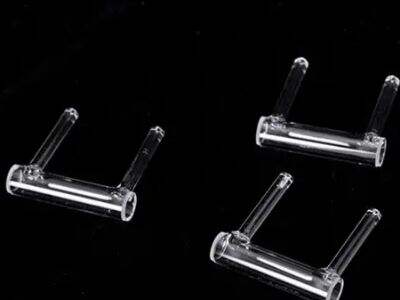Proper scientific experimentation demands that your quartz cuvettes remain clean and intact. In this data set, this is not the case and it is only up to October 2023. A quartz cuvette is one of those containers which is mostly used in the biology/life science application in order to keep a sample in the container to be tested. If you don't properly treat your cuvettes, you may end up with wrong results wasting material and time. This means that taking care of your cuvettes -- where the sample sits during a measurement -- is not about polishing; it's about ensuring your experiments yield accurate answers. How to Care for Your Cuvettes?
Quartz cuvettes are a bit more sensitive when it comes to cleaning and maintaining them, and as long as you follow these easy steps, they will work better and last longer in your experiments. Here are some things to remember:
Wear New Gloves: As soon as you touch your quartz cuvettes, wear new gloves. This Jinke Optical Quartz Cuvettes also ensures that it keeps them free from dirt and oils left on your fingers. It is like washing your hands before eating — everything needs to be clean!
Thoroughly Wash and Dry Them: Always wash and dry your cuvettes properly after every use. That means washing them with soap and water and then letting them dry completely.
Store Cuvettes: When not in use, be sure to store cuvettes in clean, dry spaces. This will help prevent dust or damage from ruining it. Maybe store them in a dedicated, safe, protected box or container.
Use a Brush: If your cuvettes need an extra scrubbing, using a soft brush might be helpful. This will help remove any contaminant without scratching the glass. Just make sure it's gentle!
Do not use the sharp tools: When cleaning your cuvettes, do not use sharp tools or rough materials. These can mar the surface or do significant damage. Handle your cuvettes like fragile glass!
Cuvette Care: Dos and Don'ts
Here's some dos and don'ts—when cleaning quartz cuvettes—to help make sure they stay in tiptop condition:
Do:
Use Gentle Cleaners: Always use distilled water or a mild soap to wash your cuvettes. Harsh chemicals can be harmful; mild is best.
Wash Well: Follow with a thorough rinse to ensure that no soap remains on the cuvettes. This is an important step to ensure that nothing remains that can ruin your results.
Corrective Over Drying: Always clean and dry your cuvettes using clean air or a soft cloth Be wary, however of things that could leave lint on because it will influence your test also
Do Not
Do not use strong chemicals since those are probably scratching your cuvettes, making stains; your jars need to stay transparent and free from impurities so the result comes out as good.
Organic Solvents are a No-Go: Avoid organic solvents, they can leave residues or even dissolve parts of your cuvette.
Don't Soak or Scrub Hard: Avoid letting your cuvettes soak too long, and avoid scrubbing them roughly.
Maintaining Accuracy and Precision of Your Cuvettes
It is very important to clean and take care of your cuvettes after you use them so that they will serve you well in your subsequent experiment. Here a few steps you can take to keep them accurate:
Be sure to gently remove samples: Remove the sample when the experiment is finished. Gentle, to ensure you leave no bits behind in the cuvette.
Douse with Mustard: If it is oily, douse the cuvette with mustard. This Jinke Optical Optical Cuvettes cleans out anything captured within.
Rinse Dry: After rinsed out, dry the cuvette with some clean air or a lint-free cloth. Just be sure that it's totally dry before you put it away.
Store Safely: When you are done with a test, place the cuvette in a clean, dry container until you use it again.
Prevention of Damage
When used properly, quartz cuvettes can go a long time, and, taking proper care of it is as valuable as it helps you save times and money in later stages. There are some pretty useful tips for you to get rid of damage:
Calibration of the instrument: There should be checking of standards and your cuvettes for some scratches or scratches.
Store It in Dark Containers. Your cuvettes may end up damaged over time with excessive exposure to the sun, but storing your cuvettes in dark containers does away with sunlight damage. Store your cuvette in darkened containers.
Quality Check. Ensure precision by regularly monitoring the accuracy of your measurements before you begin experiment after experiment. Jinke Optical Quartz Vapor Cells will quickly reveal any likely flaws in yours.
Where to Consult about Cuvette Care
And if you have any question about how to clean and how to care for quartz cuvettes, it will always be best to refer to someone who is experienced. If you have any question regarding quartz cuvettes or any of our other products, please do not hesitate to reach out. Do not hesitate to contact us for guidance — we are here for you!
If you keep your quartz cuvettes in good order, you will be sure they work effectively for several tests. Discover useful methods for maintaining cuvettes precise and long-lasting by following the suggestions of Jinke Optical.
 EN
EN
 AR
AR
 BG
BG
 HR
HR
 CS
CS
 DA
DA
 NL
NL
 FI
FI
 FR
FR
 DE
DE
 EL
EL
 HI
HI
 IT
IT
 JA
JA
 KO
KO
 NO
NO
 PL
PL
 PT
PT
 RO
RO
 RU
RU
 ES
ES
 SV
SV
 TL
TL
 ID
ID
 LV
LV
 SR
SR
 SK
SK
 UK
UK
 VI
VI
 HU
HU
 MT
MT
 TH
TH
 TR
TR
 FA
FA
 AF
AF
 MS
MS
 GA
GA
 IS
IS
 LA
LA
 KK
KK







